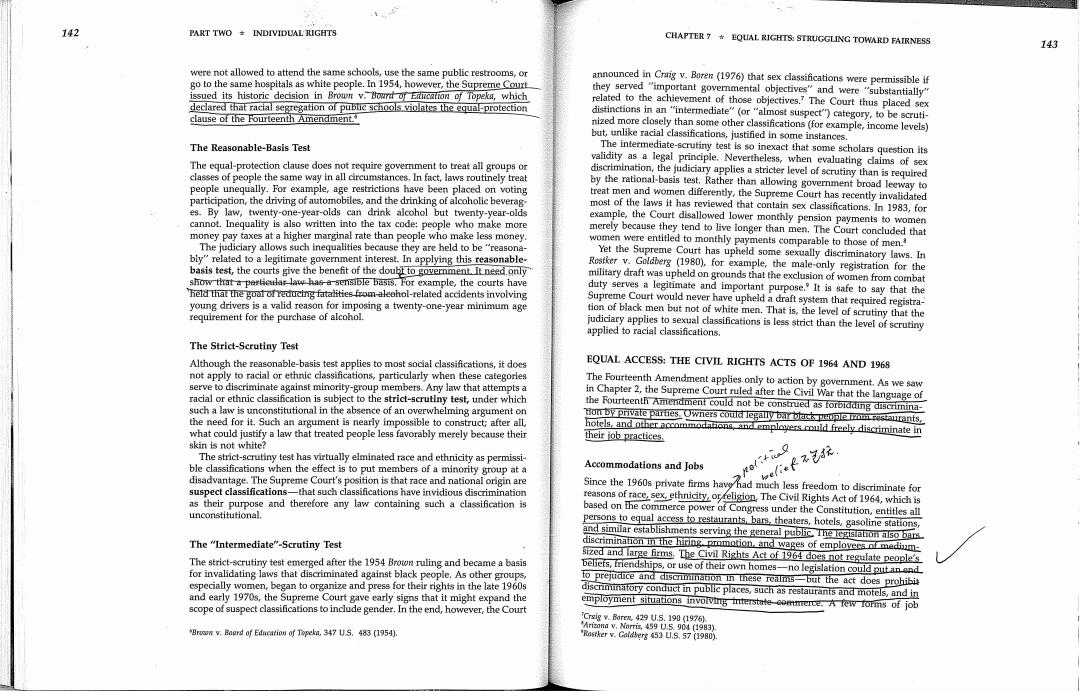正在加载图片...

142 PART TWO INDIVIDUAL RIGHTS CHAPTER 7*EQUAL RIGHTS:STRUGGLING TOWARD FAIRNESS 143 were not allowed to attend the same schools,use the same public restrooms,or go to the same hospitals as white people.In 1954,however,the Supreme Courl announced in Crig v.Boren(1976)that sex classifications were permissible if issued its historic decision in Brown v.Bourd of Edncation of Topeka,which they served "important governmental objectives"and were "substantially" declared that racial segregation of public schools violates the equal-protection related to the achievement of those objectives.?The Court thus placed sex clause of the Fourteenth Amendment. distinctions in an"intermediate"(or"almost suspect category,to be scruti- nized more closely than some other classifications (for example,income levels) but,unlike racial classifications,justified in some instances. The Reasonable-Basis Test The intermediate-scrutiny test isso inexact that some scholars question its The equal-protection clause does not require government to treat all groups or validity as a legal principle.Nevertheless,when evaluating claims of sex classes of people the same way in all circumstances.In fact,laws routinely treat discrimination,the judiciary applies a stricter level of scrutiny than is required people unequally.For example,age restrictions have been placed on voting by the rational-basis test.Rather than allowing government broad leeway to participation,the driving of automobiles,and the drinking of alcoholic beverag- treat men and women differently,the Supreme Court has recently invalidated es.By law,twenty-one-year-olds can drink alcohol but twenty-year-olds most of the laws it has reviewed that contain sex classifications.In 1983,for cannot.Inequality is also written into the tax code:people who make more example,the Court disallowed lower monthly pension payments to women money pay taxes at a higher marginal rate than people who make less money. merely because they tend to live longer than men.The Court concluded that The judiciary allows such inequalities because they are held to be "reasona- women were entitled to monthly payments comparable to those of men. biy"related to a legitimate government interest.In applying this reasonable- Yet the Supreme Court has upheld some sexually discriminatory laws.In basis test,the courts give the benefit of the doubt to government It need.only Rostker v.Goldberg (1980),for example,the male-only registration for the show that a parteular law-has-a-sensible basis.For example,the courts have military draft was upheld on grounds that the exclusion of women from combat held that the goal of reducing fatalities from-aleohol-related accidents involving duty serves a legitimate and important purpose.It is safe to say that the young drivers is a valid reason for imposing a twenty-one-year minimum age Supreme Court would never have upheld a draft system that required registra- requirement for the purchase of alcohol. tion of black men but not of white men.That is,the level of scrutiny that the judiciary applies to sexual classifications is less strict than the level of scrutiny applied to racial classifications. The Strict-Scrutiny Test Although the reasonable-basis test applies to most social classifications,it does EQUAL ACCESS:THE CIVIL RIGHTS ACTS OF 1964 AND 1968 not apply to racial or ethnic classifications,particularly when these categories serve to discriminate against minority-group members.Any law that attempts a The Fourteenth Amendment applies only to action by government.As we saw racial or ethnic classification is subject to the strict-scrutiny test,under which in Chapter 2,the Supreme Court ruled after the Civil War that the language of such a law is unconstitutional in the absence of an overwhelming argument on the Fourteenth Amendment could not be construed as forbidding discrimina- the need for it.Such an argument is nearly impossible to construct;after all, tion by private parties.Owners could legally bar black perple trom rastaurants, what could justify a law that treated people less favorably merely because their hotels,and other accommodations,and cmplovers could frecly discriminate in their job practices. skin is not white? The strict-scrutiny test has virtually elminated race and ethnicity as permissi- ble classifications when the effect is to put members of a minority group at a Accommodations and Jobs disadvantage.The Supreme Court's position is that race and national origin are suspect classifications-that such classifications have invidious discrimination Since the 1960s private firms havy had much less freedom to discriminate for as their purpose and therefore any law containing such a elassification is reasons of race,sex,ethnicity,or feligion.The Civil Rights Act of 1964,which is unconstitutional. based on the commerce power of Congress under the Constitution,entitles all persons to equal access to restaurants,bars,theaters,hotels,gasoline stations, and similar establishments serving the general public.The legislaton also bars The "Intermediate"-Scrutiny Test discrimination in the hiring promotion,and wages of emplovees of medium- The strict-scrutiny test emerged after the 1954 Browon ruling and became a basis sized and large firms.The Civil Rights Act of 1964 does not regulate people's for invalidating laws that discriminated against black people.As other groups, beliets,friendships,or use of their own homes-no legislation could put an ond especially women,began to organize and press for their rights in the late 1960s to prejudice and discnmination in these realms-but the act does prohibis and early 1970s,the Supreme Court gave early signs that it might expand the discniminatory conduct in public places,such as restaurants and motels,and in scope of suspect classifications to include gender.In the end,however,the Court employment situations involving interstate commerce.A lew forms of job Crsig v.Bores,429 U.S.190 (1976) Brooon v.Baard of Education of Topeka,347 U.S.483 (1954)